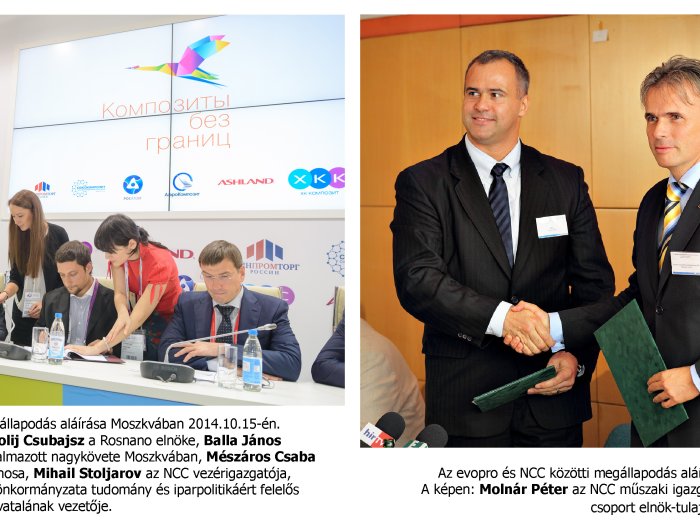NEWS
Russia will join the production of the composite structure Modulo bus family after an agreement was signed between the Russian NCC and the Hungarian evopro at the Open Innovations Forum.
The agreement, which was signed in Moscow on October 15, 2014 was confirmed at a press conference on October 16 at the 7th Hungarian-Russian Economic Forum and Business Meeting by Csaba Mészáros, owner and CEO of the company group that developed the composite structure buses, and by Péter Molnár, technical director of NCC.
NCC, which is owned by Rosano and other large corporations, has a modern technology platform and capacity in Moscow’s innovation park at the former site of the Moskvitch manufacturing plant that can serve as a basis for preparing large-scale production of the composite structures for the Modulo bus. By combining Hungarian innovation with Russian devices and international technology, the series production of the lightweight urban and suburban buses can launch its international expansion, starting with the East.
As a first step, the agreement calls for the production of 50 various size chassis. For this, evopro has already delivered production tools to Moscow, which will continue to be owned by the company. The first few series will serve as a template for making additional production tools. The assembly of the first buses will be completed at the plant of the customer, MABI-BUS Ltd. The signing ceremony was attended by Anatoliy Chubais, president of Rosano, as well as several interested professionals. Ultratransmarsh, manufacturer of low-floor trams and a potential partner, has long-term plans to expand its portfolio by manufacturing a significant number of evopro’s buses at the foot of the Ural mountains. For this, evopro already has automotive industry automation experience in addition to the manufacturing license required for the composite structure and the technological know-how necessary for assembly. Building on the engineering know-how from partnerships with renowned automotive companies (Audi, Daimler, Suzuki, BMW, Opel) the production lines for series production have already been designed. Based on the level of interest so far this will be needed, as Kazakh and Belarusian partners have also expressed strong interest not only in buying the buses, but also in manufacturing them locally. Kazakhstan’s Prime Minister Karim Masyimov and his delegation have already inspected the electric prototype of the Modulo bus family during their visit to Hungary in June, and now representatives from Belarusia and Yekaterinburg have also been able to try it out. According to Csaba Mészáros, owner and CEO of the company group that developed the composite buses, this agreement is an important step for Hungary’s opening eastern policy. Péter Molnár, technical director of NCC, emphasized that Russia’s ambition is to use innovative solutions in more and more areas, and composite vehicle manufacturing is a top priority in the country.
Composite Structure Modulo Bus Family The chassis of the bus is a self-supporting structure made of fiber glass composite rings. The ultralight chassis reduces fuel consumption by 20%, reduces damage to the road surface, and provides 50% more interior space which allows for greater passenger capacity. There’s no danger of corrosion for the composite vehicle, so its life span is significantly longer and its lifecycle maintenance costs are considerably less than those of buses built with conventional technologies. Its powertrain is also modular as it can be fitted with pure electric, hybrid electric-diesel, CNG, or EURO6 diesel drivechains. The next phase of development will focus on a trolley drive. The engineers created a construction that is a simple but stable solution.
About the evopro Group The evopro group started with engineering services in 2001, and after gaining sufficient experience it has been able to implement its own projects, primarily in airport logistics, then in automotive and process automation fields. As a next step, it has launched independently developed, innovative products. Some good examples of this are the Hungarian Product Grand Prix winner eRDM railway diagnostic system, or the composite structure electric and hybrid drive Modulo bus family. In the automotive industry the engineering group sees great opportunity in the delivery of complete assembly lines and in the spread of bodyworks made of composite materials. There is also great need for the expertise of our engineers in physics research projects like ITER, ESS (European Spallation Source), or ELI (Extreme Light Infrastructure), or in the expansion of the Paks Nuclear Power Plant. In addition to mechanical and electrical engineering services for international industry there is ongoing innovative hardware and software development combining cutting-edge solutions. The member companies are also active in several large international R&D&I projects. The company group has several innovation projects for professional investment. The validity of the principles and strategy followed by the evopro group over a decade and a half has been demonstrated by world-class system integrator partnerships, acquisitions by two major multinational corporations (Siemens and Accenture), and by numerous prizes and awards. In 2013 the company group employed over 1000 engineers in 40 countries on 6 continents who have acquired world-class professional know-how in various projects. www.evopro-group.com
About NCC The Moscow-based Nanotechnology Center for Composites develops and manufactures composite products for a wide variety of industrial applications. The company was founded in 2011 by the Russian CJSC HC Composite and the Infrastructure and Educational Programs Fund. It was later joined by DowAksa, a subsidiary of the world-famous Dow Chemicals. An expressed goal of the NCC is to build modern composite manufacturing technologies in the automotive industry and to develop them further so they can be used in automated series production. www.nccrussia.com

